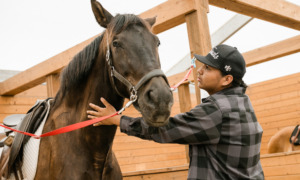 Growing up, I didn’t have a lot of the same opportunities as other kids I knew. My parents struggled with mental health issues, and I was considered a “street kid.” I didn’t follow the rules, and no one expected a lot from me.
Growing up, I didn’t have a lot of the same opportunities as other kids I knew. My parents struggled with mental health issues, and I was considered a “street kid.” I didn’t follow the rules, and no one expected a lot from me.
School was much of the same. With learning differences that made excelling academically virtually impossible, I focused on other things that I thought I was good at. This led me down a path of anger, crime and self-destruction. I was 14 years old, and I had given up on graduating high school.
I didn’t have direction in life until an amazing lady stepped forward. She was my best friend’s mom, and to this day I know her lovingly as “Mama Jackson.” With her help and the incentive of a warm meal, I started doing my homework and aiming for more in life. She was the first person to show me that I needed to hold myself accountable for the decisions I was making.
This relationship paved the way for me to graduate high school. With Mama Jackson’s support, I moved on into higher education and finished graduate school. Since the day Mama Jackson took me off the streets and under her wing, I have never doubted the power of a positive adult relationship.
What gave me these opportunities started with a relationship and became a journey to my own resilience breakthrough. I wanted to help students like me overcome their challenging life circumstances. I wanted to be that positive adult relationship and teach others to do the same.
I founded a program called WhyTry that has been delivered to millions of students worldwide. I wrote the book “The Resilience Breakthrough” to help the adults in these kids’ lives enhance their own resilience. I have worked for more than 20 years to show students they can be resilient, no matter what.
I firmly believe that resilience is not just something you’re born with — it’s something that can be taught to both children and adults. This breakthrough idea comes after years of working directly with students, but current research backs me up.
Ann Masten, Ph.D., directs the Project Competence Studies of Risk and Resilience at the University of Minnesota’s Institute of Child Development. Her work essentially shows that we can assume every individual has the capacity for resilience if provided with “assets” (like evidence-based programs and tools) and environments (like positive relationships at school) that help enhance it. This means that even when we can’t take away a child’s problems, we can equip that child to deal with them effectively.
Other studies also show that when students score higher on resilience measures, they have improved social skills, higher grades, a greater love of learning and better decision-making skills.
[Related: Troubled No More, Youths Bring Stories of Their Resilience to Probation Professionals]
If this is true, then how important is it for us as educators, counselors and teachers to provide these life-saving resilience skills through the use of social-emotional learning (SEL) programs. Don’t students deserve a fighting chance to face their struggles head on?
In education, life circumstances get in the way of learning. Children face many adversities that detract from the messages we are trying to send. Difficulties at home, bullying, poverty, depression, negative friendships, hunger, divorced parents, abuse, neglect and gang violence all supersede school and common core lessons.
How can a child learn math when the world around him or her is falling apart? Kids don’t feel connected to the message. They don’t see the relevance to real life.
We have a social justice issue on our hands. During the next 20 years, many students will get access to the evidence-based SEL and resilience tools I’m talking about, but many more will not. According to Collaborative for Academic, Social, and Emotional Learning (CASEL), only three states have developed standards for social emotional learning programs. The skills of resilience should be at everyone’s fingertips. No kid should have to make their way through life without them.
Resilience, as I have come to define it, is the ability to bounce back when you have every reason to shut down — but you fight on! What profound knowledge that we can give this gift to others.
By incorporating social emotional learning programs into our regular lessons — whether that’s in schools, correctional facilities or counseling sessions — we help students receive the tools they need to develop their own resilience. The access to social emotional learning programs is the responsibility of public education influencers — one that we need to focus on 100 percent.
We have an obligation to give students not just the answers to test questions. We must give them the answers to life and how to navigate it successfully. I argue that a kid who has the skills of resilience can have an advantage over a Harvard graduate. If that kid knows how to “flip the switch” and view adversity as a fuel source, the challenges of life won’t affect that kid as deeply as they would for someone who’s lacking resilience, however academically successful.
Children who have not developed important social and emotional skills will break when things get tough. Children who ultimately overcome are those who have been taught how to thrive under any circumstances.
And isn’t that our ultimate goal?
Christian Moore is a licensed clinical social worker and founder of the WhyTry Organization. He is the author of “The Resilience Breakthrough — 27 Tools for Turning Adversity Into Action.” Moore is also a national speaker on the topic of academic and corporate resilience.
More related articles:
OP-ED: How Do We Build Resilience Among Youth?
Communities Need to Help Heal the Traumatized Juvenile Delinquent
OP-ED: Treating the Cause, Not the Symptom, When Juvenile Justice and Mental Health Meet

























